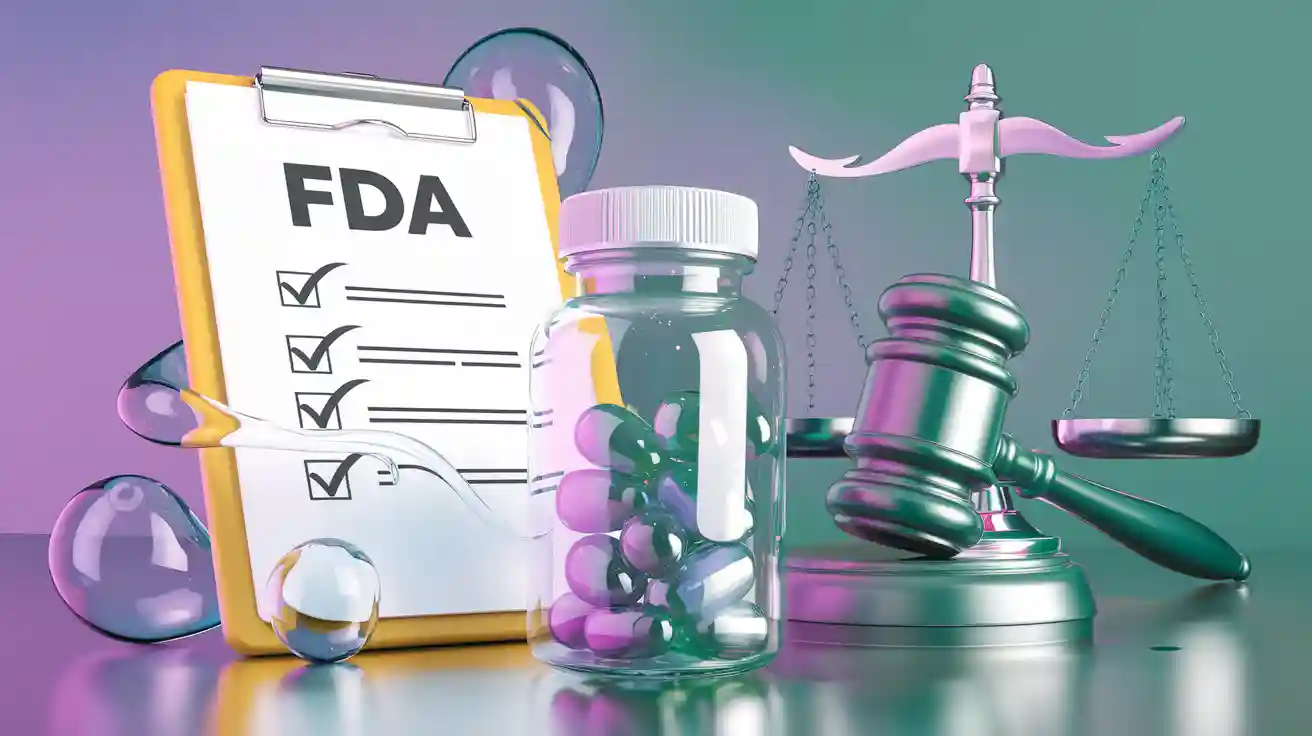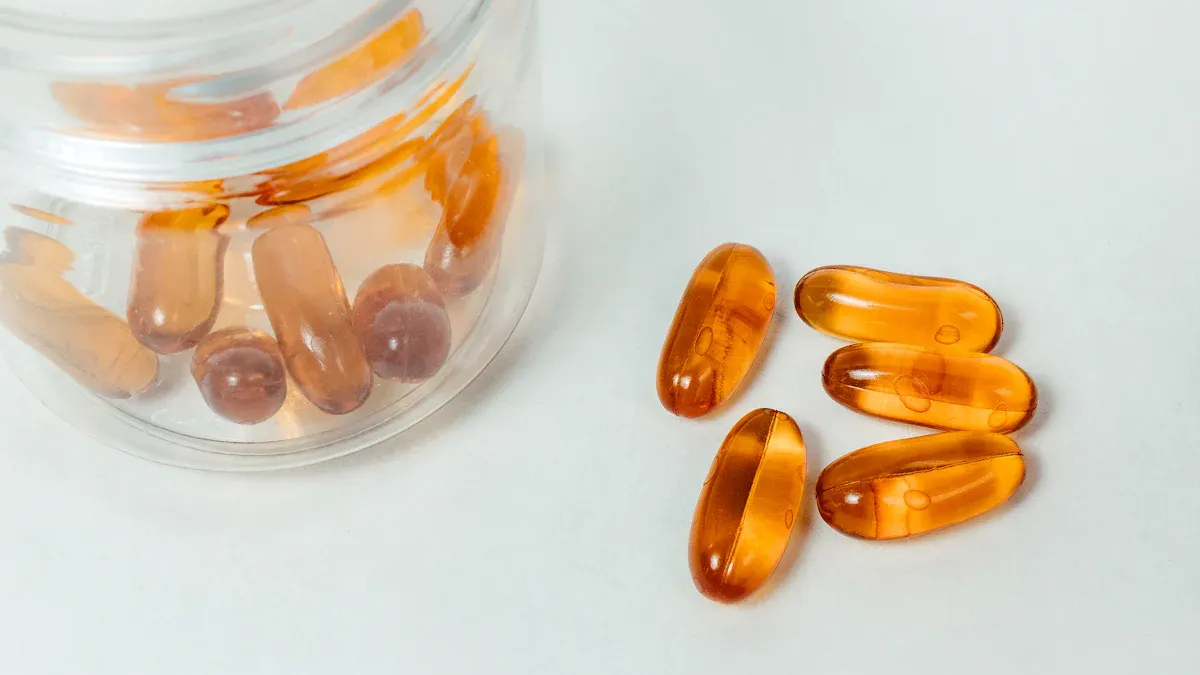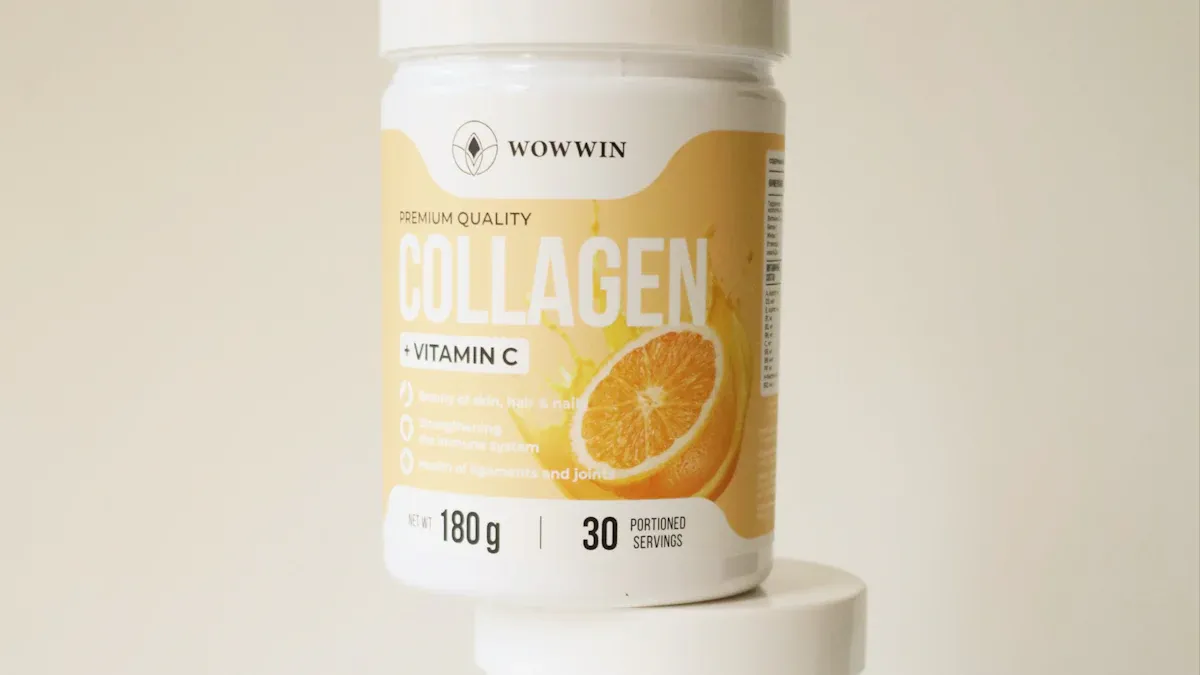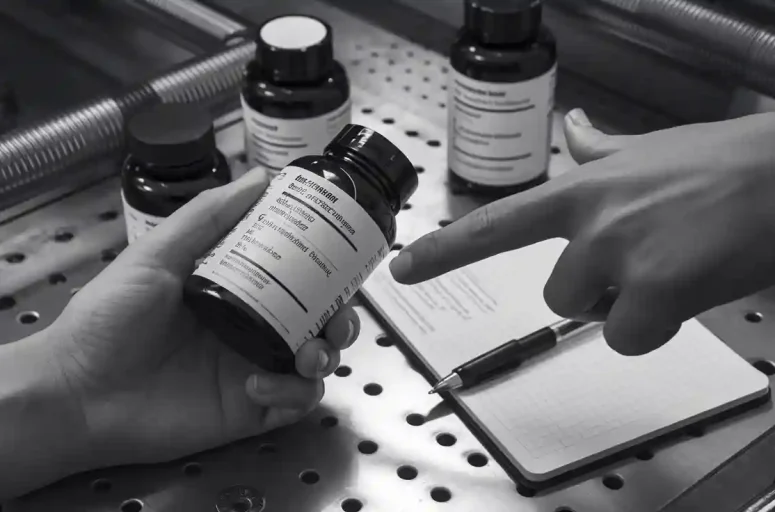
You might wonder if the FDA actually regulates supplements. The FDA does oversee supplements, but not in the same way it approves drugs. Instead, the FDA monitors supplement safety after products reach the market. This difference means you need to stay alert as a consumer. Each year, about 23,000 people in the United States visit emergency departments because of adverse events linked to supplements, especially herbal and weight-loss products. Knowing how FDA supplement regulation explained can help you make safer choices.
Medical Disclaimer: This article is for educational purposes only. It does not provide medical advice. Always consult a healthcare professional for guidance tailored to your needs.
Key Takeaways
The FDA does not approve dietary supplements before they reach the market but monitors their safety after sale.
Dietary supplements are regulated less strictly than prescription drugs, so safety and effectiveness are not guaranteed before purchase.
Manufacturers must follow good manufacturing practices to ensure supplement quality, but the FDA inspects only a small portion of facilities each year.
Always read supplement labels carefully, checking ingredients, serving sizes, claims, and warnings to make safe choices.
Supplements cannot legally claim to treat, cure, or prevent diseases; watch out for products that make these claims.
Look for third-party certifications like NSF or USP to find high-quality supplements from reputable brands.
Consult healthcare professionals before starting any supplement to avoid harmful interactions and get personalized advice.
Report any adverse effects or problems with supplements to the FDA to help improve safety for all consumers.
FDA supplement regulation explained
FDA’s role
You might think the FDA approves every supplement before it reaches store shelves, but that is not the case. The FDA’s authority over dietary supplements is different from its authority over drugs and foods. The FDA does not review or approve dietary supplements for safety or effectiveness before they are sold. Instead, the FDA focuses on post-market oversight. This means you can find a supplement on the market even if the FDA has never evaluated it.
The FDA’s main responsibilities include monitoring the safety of finished dietary supplement products and their ingredients. The agency checks that supplements meet certain labeling requirements and follow good manufacturing practices. If you experience a problem with a supplement, the FDA can investigate and take action, such as issuing warnings or recalls. However, the FDA must first prove that a dietary supplement is unsafe or misbranded before it can remove the product from the market.
To help you understand how the FDA’s authority compares across different product types, see the table below:
Product Type | FDA Authority Scope | Key Regulatory Requirements and Focus |
|---|---|---|
Drugs | Highest regulatory authority; requires premarket approval before marketing | Must demonstrate safety, efficacy, and effectiveness through clinical trials; submit IND and NDA; post-approval monitoring |
Dietary Supplements | Limited authority under the Dietary Supplement Health and Education Act of 1994 (DSHEA) | No premarket approval required; regulated for definition, labeling, and good manufacturing practices (GMP) to ensure safety |
Foods | Moderate authority under Federal Food, Drug, and Cosmetic Act (FD&C Act) | Regulates safety and labeling to prevent adulterated or misbranded foods; conducts inspections; does not regulate advertising or meat/poultry (USDA jurisdiction) |
The FDA supplement regulation explained here shows that the agency’s oversight of dietary supplements is less strict than its oversight of drugs. This approach places more responsibility on manufacturers to ensure the safety and quality of their products.
Key differences from drug regulation
You need to know that dietary supplements and prescription drugs follow very different regulatory paths. Prescription drugs must go through a strict FDA approval process before they reach you. Drug manufacturers must prove their products are safe and effective through clinical trials. The FDA reviews all the data, checks the manufacturing process, and only then allows the drug to be sold.
Dietary supplements do not require FDA approval before they appear on store shelves. Manufacturers do not have to prove that a supplement is safe or effective before selling it. The FDA steps in only after the supplement is on the market, usually when someone reports a problem or when the agency finds a safety concern.
Here is a comparison of the main differences between FDA regulation of prescription drugs and dietary supplements:
Regulatory Aspect | Prescription Drugs (Rx) | Dietary Supplements |
|---|---|---|
Required | Not Required | |
Evidence of Safety and Efficacy | Required | Not Required |
Manufacturing and Quality Control Standards | Strictly enforced | Less stringent |
FDA Approval to Treat Disease | Allowed | Not Allowed |
FDA Oversight | Rigorous, premarket | Post-market only |
This table highlights that prescription drugs face much stricter FDA regulations than dietary supplements. The FDA supplement regulation explained here means that supplements can be sold without any proof of safety or effectiveness. You may find unsafe or mislabeled supplements on the market until the FDA receives reports of adverse events and investigates.
The main law that shapes FDA supplement regulation explained is the Dietary Supplement Health and Education Act (DSHEA) of 1994. DSHEA defines dietary supplements as a special category of food. Under DSHEA, the FDA cannot require premarket approval for dietary supplements. The agency can only act after a supplement is on the market and evidence shows it is unsafe or mislabeled. This law has allowed the dietary supplement industry to grow rapidly, but it also means you need to be careful when choosing supplements.
Note: The FDA supplement regulation explained here shows that the agency’s oversight is mostly reactive, not proactive. You should always read labels, check for third-party testing, and talk to your healthcare provider before starting any new supplement.
What are dietary supplements?

Definition
You may see many products labeled as a dietary supplement in stores or online. The FDA defines a dietary supplement as a product you take by mouth that contains a dietary ingredient. This ingredient can be a vitamin, mineral, herb, amino acid, or another substance that adds to your diet. A dietary supplement comes in forms like tablets, capsules, powders, gummies, or liquids.
Under federal law, a dietary supplement must:
Include a Supplement Facts panel with serving size, servings per container, dietary ingredients, and amounts.
Not claim to treat or prevent diseases. If a product claims to cure or prevent a disease, the FDA considers it a drug, not a dietary supplement.
Meet safety standards set by the FDA, but the FDA does not approve supplements before they reach the market.
Require the manufacturer to ensure the supplement is safe and not misbranded.
Manufacturers must follow good manufacturing practices to keep dietary supplements safe and high quality. You should always check the label for these details before using any supplement.
Types of supplements
You will find many types of dietary supplements on the market. Some of the most common include:
Supplement Type | Age 20–39 Usage (%) | Age 40–59 Usage (%) | Age 60 and Over Usage (%) |
|---|---|---|---|
Multivitamin-mineral | 24.0 | 29.8 | 39.4 |
Vitamin D | 6.7 | 17.4 | 36.9 |
5.4 | 12.5 | 21.8 | |
Fourth most common | Vitamin C (5.2) | Botanicals (8.3) | Calcium (19.2) |
Fifth most common | Botanicals (5.1) | Calcium (7.7) | Vitamin B12 (12.4) |

You might use a dietary supplement to add nutrients to your diet or support your health. Multivitamin-mineral supplements are the most popular, especially among older adults. Vitamin D and omega-3 fatty acids are also common. Some people choose botanicals, calcium, or vitamin B12 supplements based on their needs.
Dietary supplements can also include products like protein powders, probiotics, and herbal extracts. Each supplement serves a different purpose, so you should always read the label and talk to a healthcare provider before starting a new dietary supplement.
What is not included
Not every product you see in the supplement aisle counts as a dietary supplement. The FDA excludes certain products from this category. You should know that:
Products first marketed as drugs, antibiotics, or biologics and that have gone through substantial clinical investigations do not qualify as dietary supplements.
If a product was sold as a dietary supplement or food before it became a drug, it may still be considered a dietary supplement.
Products that claim to treat, cure, or prevent diseases are not dietary supplements. The FDA treats these as drugs and regulates them differently.
You need to check if a supplement fits the FDA’s definition before using it. Always look for the Supplement Facts panel and make sure the product does not make disease treatment claims. If you see a product that promises to cure or prevent a disease, you should be cautious. The FDA may not consider it a dietary supplement, and it could be subject to stricter rules.
FDA regulation framework
DSHEA overview
You need to understand the Dietary Supplement Health and Education Act of 1994 (DSHEA) because it forms the backbone of dietary supplement oversight in the United States. DSHEA defines what counts as a dietary supplement and sets the rules for how you, as a consumer, can access these products. This law treats dietary supplements as a special category of food, not as drugs. DSHEA covers definitions, safety, claims, labeling, new ingredient rules, good manufacturing practices, and enforcement.
Here are some of the most important provisions of DSHEA:
DSHEA defines dietary supplements as products you take by mouth that contain vitamins, minerals, herbs, amino acids, or other substances to supplement your diet.
The law distinguishes between ingredients sold before October 15, 1994, and new dietary ingredients. New ingredients must meet extra fda requirements for safety.
DSHEA requires manufacturers to follow current good manufacturing practices (cGMPs) designed for dietary supplements.
The law gives the fda authority to remove unsafe supplements from the market if they pose a significant or unreasonable risk.
DSHEA allows certain claims about how a supplement affects the structure or function of your body, but it prohibits disease treatment claims.
Description | |
|---|---|
Definition of Dietary Supplement | Products intended to supplement the diet, containing vitamins, minerals, herbs, amino acids, or other substances, labeled as dietary supplements. |
Safety of Dietary Supplements | Sets conditions for when a supplement is considered adulterated and places the burden of proof on the fda. |
Claims | Allows structure/function claims with substantiation and notification, but prohibits disease claims. |
Dietary Supplement Labeling | Requires ingredient listing, identification as a dietary supplement, and compliance with nutrition labeling. |
New Dietary Ingredients | Requires pre-market notification and safety evidence for ingredients not sold before October 15, 1994. |
Good Manufacturing Practices (GMPs) | Authorizes the fda to set cGMPs for dietary supplements; non-compliance means the supplement is adulterated. |
DSHEA aims to balance consumer access to dietary supplements with the need for safety standards and regulatory oversight.
Pre-market requirements
Ingredient safety
You might think all dietary supplements go through strict safety checks before you see them in stores. In reality, most ingredients used before October 15, 1994, are “grandfathered” and do not require new safety data. If a manufacturer wants to use a new dietary ingredient (NDI), the fda requires a pre-market safety notification.
Manufacturers or distributors must submit a notification to the fda at least 75 days before selling a supplement with a new dietary ingredient. This notification must include:
The name and address of the company.
The name of the new dietary ingredient, including its scientific name if it is a plant.
A description of the supplement, including how much of the new ingredient it contains, how you should use it, and any evidence of safety.
Copies of any scientific studies or published materials supporting the safety of the ingredient.
A signed statement from a responsible person.
If the company does not submit this notification, the supplement is considered adulterated and illegal to sell. The fda expects companies to show that the new dietary ingredient is reasonably expected to be safe when used as directed. This process helps protect you from unsafe or untested dietary supplements.
Good Manufacturing Practices (GMPs)
You rely on the quality and purity of every dietary supplement you buy. The fda sets current good manufacturing practices (cGMPs) for dietary supplements to help ensure this. These cGMPs require manufacturers to control every step of production, from raw materials to finished products.
Manufacturers must:
Test ingredients for identity, purity, strength, and composition.
Keep detailed batch production records.
Qualify and verify suppliers.
Set and follow written procedures for quality control.
Test finished supplements for contaminants and potency.
Investigate and document any deviations or complaints.
The fda inspects supplement manufacturers to check compliance with cGMPs. Common violations include failing to keep proper records, not testing ingredients, and not following written quality control procedures. About 40% of inspected firms do not have proper specifications for identity, purity, strength, or composition. These failures can lead to warning letters or recalls.
You should look for supplements from companies that follow cGMPs and have strong quality control systems. This helps protect the safety of supplements and ensures you get what the label promises.
Post-market oversight
Once a dietary supplement reaches the market, the fda shifts to post-market oversight. The agency monitors the safety of dietary supplements by reviewing reports of adverse events, inspecting manufacturing facilities, and checking labels for accuracy. However, the fda only records about 1% of all adverse events related to dietary supplements. Poison control centers detect many more problems, but they do not always share this information with the fda.
The fda can take action if it finds a supplement that is unsafe, misbranded, or does not meet safety standards. Actions include issuing warning letters, recalling products, or banning dangerous ingredients. The agency also uses tools to prioritize which chemicals or supplements to review, but these tools do not focus only on dietary supplements.
Recent changes in fda staffing and inspection priorities may affect how often the agency inspects supplement manufacturers. Even with increased inspections, only about 5% of known supplement facilities get checked each year. This means you need to stay alert and choose supplements from reputable companies.
Tip: Always report any problems or side effects you experience with a dietary supplement to the fda. Your report helps improve dietary supplement safety for everyone.
The fda regulation framework relies on a mix of pre-market notifications, cGMPs, and post-market oversight. You play a key role in dietary supplement safety by staying informed and making careful choices.
Labeling and claims regulation

Label requirements
When you pick up a dietary supplement, the label gives you important information. The FDA sets strict rules for the labeling of dietary supplements. You should always check for these required elements on a dietary supplement label:
Net quantity of contents
Name and address of the manufacturer, packer, or distributor
Directions for use
The Supplement Facts Panel is a key part of every dietary supplement label. This panel must include:
Serving size
List of dietary ingredients
Amount per serving size (by weight)
Percent of the daily value (%DV)
You will also see nutrients like calories, fat, cholesterol, sodium, carbohydrates, fiber, sugars, protein, vitamin A, vitamin C, calcium, and iron listed if present in measurable amounts. If the supplement contains trans fat, it must appear under saturated fat. Ingredients without established daily values must show a footnote stating “Daily Value Not Established.” Non-dietary ingredients, such as binders or fillers, appear below the Supplement Facts Panel.
Tip: Always read the dietary supplement label carefully. This helps you understand what you are taking and supports your safety.
Types of claims
You will notice different types of claims on dietary supplement labels. The FDA allows three main types:
Claim Type | Description | FDA Requirements |
|---|---|---|
Health claims | Link a dietary ingredient to reduced risk of a disease or health condition. | Must be authorized by the FDA and based on strong scientific evidence. |
Nutrient content claims | Describe the level of a nutrient in the supplement (such as “high in vitamin C”). | Must meet FDA standards for nutrient levels and use approved terms. |
Explain how a nutrient or ingredient affects normal body structure or function (like “supports immune health”). | Must be truthful, not misleading, and supported by scientific evidence. Must include a specific FDA disclaimer. |
You cannot find disease treatment claims on dietary supplements. The FDA does not allow supplements to claim they diagnose, treat, cure, or prevent diseases. If you see such claims, the product may not follow FDA rules.
Disclaimers and warnings
You should always look for disclaimers and warnings on dietary supplement labels. Structure/function claims must have a clear disclaimer. The label must state:
This disclaimer must appear in a box with bold text and use the full name “Food and Drug Administration.” If the supplement makes more than one claim, the disclaimer changes to the plural form.
Other warnings you might see include:
“Keep out of reach of children”
Age restrictions, such as “Not for use by individuals under 18”
Pregnancy or breastfeeding warnings
Allergy alerts for common allergens
Advice to consult a healthcare professional before use, especially if you have health conditions or take medication
If the supplement contains iron, you will see a special warning about accidental overdose in children. Always follow these warnings to protect your health.
Note: The labeling of dietary supplements helps you make informed choices. Always check the dietary supplement label for claims, disclaimers, and warnings before using any supplement.
Federal regulation of dietary supplements
Enforcement powers
You might wonder how the FDA protects you from unsafe dietary supplements. The FDA uses several enforcement tools to keep the safety of supplements in check. Inspectors visit manufacturing facilities to look for problems. If they find violations, they issue a Form FDA 483 to document their concerns. When companies do not fix these issues, the FDA sends Warning Letters. These letters highlight problems like adulteration, poor manufacturing practices, or mislabeling. The FDA can also recall products, ban dangerous ingredients, or take legal action if a dietary supplement poses a serious safety and risk to your health.
The FDA focuses on two main legal standards: adulteration and misbranding. A dietary supplement is adulterated if it contains harmful ingredients, lacks proper safety data for new ingredients, or is made under unsafe conditions. Misbranding happens when the label is false, misleading, or missing key information. The FDA can act quickly on misbranding, even if the product does not cause harm. These consumer protection regulations help ensure that dietary supplements meet federal standards for safety and labeling.
Tip: Always check for recalls or warnings about dietary supplements before you buy or use them.
Limitations of FDA authority
You need to know that the FDA cannot review or approve most dietary supplements before they reach the market. Under current regulations, manufacturers do not have to tell the FDA about their products unless they use a new dietary ingredient. Most supplements enter stores without any FDA review. The FDA relies on post-market surveillance, such as consumer complaints and facility inspections, to find unsafe products. This approach means that dangerous supplements can stay on shelves for months, even after a recall. Research shows that more than half of recalled dietary supplements remain available six months later.
The FDA also lacks mandatory recall authority for supplements. Most recalls are voluntary, so some companies may not remove unsafe products right away. These gaps in federal regulation of dietary supplements make it harder for the FDA to protect you from hidden safety and risk issues. You must stay alert and choose products from trusted brands.
Adverse event reporting
Reporting serious problems with dietary supplements helps improve the safety of supplements for everyone. If you experience a serious side effect, you should report it to the FDA. Manufacturers, packers, and distributors must report serious adverse events within 15 business days. They use the FDA Safety Reporting Portal or Form FDA 3500 (MedWatch) to submit details about the supplement, the incident, and the person affected. Companies must keep these records for at least six years.
Healthcare professionals and consumers can also report problems voluntarily. Your report can help the FDA spot dangerous trends and take action to protect public health. These consumer protection regulations rely on your input to keep the market safe.
Note: This article is for educational purposes only. It does not provide medical advice. Always consult a healthcare professional for guidance about dietary supplements.
Consumer guidance and safety
Reading labels
You need to read dietary supplement labels carefully to protect your safety and make informed choices. The label gives you important details about the product. Start by looking at the product name and net quantity on the front. Move to the Supplement Facts panel, usually found on the side or back. This panel shows the serving size, servings per container, and the amount of each nutrient per serving. Check the percent daily value to see how the supplement fits into your nutritional needs.
Review the ingredient list to separate active ingredients from fillers or colorings. Look for major allergens like milk, soy, gluten, or nuts in the “Contains” section. Always check the expiration date to make sure the dietary supplement is fresh and effective. Find the manufacturer’s information to verify the source. Watch for red flags such as exaggerated health claims, missing third-party certifications, or foreign language text without translation. Look for quality indicators like NSF International or USP certification. Compare price per serving and bioavailability to choose the best value. Remember, supplements are regulated differently than drugs, so you must rely on label information for safety.
Tip: Use the label to check for authenticity, correct dosage, and dietary supplement quality. Avoid products with unrealistic claims or missing safety warnings.
Choosing quality supplements
Selecting high-quality dietary supplements helps you avoid safety risks and get the best results. Look for brands that follow current good manufacturing practices (CGMP). These companies test for identity, purity, strength, and composition. They also set limits for contamination. Choose supplements that meet public quality standards, such as those from the United States Pharmacopeia-National Formulary (USP-NF).
Check for third-party testing and certification. Independent organizations like NSF International, USP, or ConsumerLab.com verify dietary supplement quality and safety. Avoid products from multi-level marketing companies, as these often lack third-party testing and may contain unsafe ingredients. Look for allergen information and vegan certification if needed. Buy from reputable retailers who store and handle supplements properly. Compare products for price, bioavailability, and ingredient transparency.
Note: High-quality dietary supplements reduce the risk of contamination and mislabeling. Always choose brands that meet public standards and have third-party certification.
Consulting healthcare providers
You should talk to a healthcare provider before starting any dietary supplement. Professionals offer personalized advice based on your health history and current medications. They help you avoid harmful interactions and choose supplements that fit your needs. Doctors, registered dietitians, and pharmacists can guide you through the complex supplement market. They check for medication interactions and recommend safe combinations.
Specialists like cardiologists or endocrinologists provide targeted advice for specific health conditions. Certified fitness trainers or sports coaches can help you select supplements for athletic goals. Consulting these professionals ensures your dietary supplement is safe, effective, and appropriate. They help you create a comprehensive health plan and minimize risks.
Medical Disclaimer: This information is for educational purposes only. It does not provide medical advice. Always consult a healthcare professional for personalized guidance about dietary supplements.
Reporting problems
You play a key role in keeping dietary supplements safe for everyone. When you report problems with supplements, you help the FDA and other consumers avoid unsafe products. Many consumers do not realize how important their reports are. If you experience a side effect, notice a strange reaction, or find a supplement that looks or smells odd, you should take action.
Why should you report supplement problems?
Your report can help remove dangerous products from the market.
The FDA uses these reports to spot trends and investigate safety issues.
Other consumers benefit from your experience and can avoid similar risks.
What should you report?
You should report any of the following:
Serious side effects, such as allergic reactions, chest pain, or trouble breathing
Unexpected symptoms, like nausea, dizziness, or skin rashes
Problems with the supplement itself, such as contamination, bad odor, or strange color
Incorrect or misleading labels
Supplements that claim to cure or treat diseases
How can you report a problem?
You have several ways to report supplement issues:
Use the FDA Safety Reporting Portal:
Go to https://www.safetyreporting.hhs.gov/ and follow the instructions. This portal is open to all consumers.Call the FDA:
You can call 1-800-FDA-1088 to report by phone.Ask your healthcare provider to report:
Doctors and pharmacists can submit reports for you.
Tip: Keep the supplement container, packaging, and receipt. This information helps the FDA investigate your report.
What happens after you report?
The FDA reviews your report and may contact you for more details. If many consumers report similar problems, the FDA can issue warnings, recall products, or ban unsafe ingredients. Your action helps protect others and improves supplement safety.
Note: Reporting problems is not just for your own safety. You help build a safer market for all consumers.
Medical Disclaimer: This information is for educational purposes only. It does not provide medical advice. Always consult a healthcare professional for personalized guidance about dietary supplements.
You now understand that FDA regulation of dietary supplements relies on postmarket actions and has important limitations. Stay alert for quality and safety concerns, especially since oversight does not guarantee every product is safe before sale. Always read labels, look for third-party certifications, and avoid supplements with unrealistic claims. Consult healthcare professionals for advice tailored to your needs. For more information or to report supplement problems, visit official FDA and NIH resources.
Medical Disclaimer: This information is for educational purposes only. It does not provide medical advice. Always consult a healthcare professional for personalized guidance.
FAQ
What does the FDA do if a supplement is found unsafe?
The FDA can issue warnings, recall products, or ban dangerous ingredients. You may see public alerts or removal of the supplement from stores.
Do you need a prescription to buy dietary supplements?
You do not need a prescription. You can buy dietary supplements over the counter at stores or online. Always check the label and consult your healthcare provider.
How can you tell if a supplement is high quality?
Look for third-party certifications like NSF or USP. Check for clear labeling, manufacturer information, and absence of exaggerated claims. Choose reputable brands.
Can supplements claim to cure diseases?
No. Supplements cannot claim to diagnose, treat, cure, or prevent diseases. If you see such claims, the product may not follow FDA rules.
What should you do if you have a bad reaction to a supplement?
Stop using the supplement immediately. Report your experience to the FDA using the Safety Reporting Portal or call 1-800-FDA-1088. Contact your healthcare provider.
Are supplements regulated the same way as drugs?
Supplements are regulated differently. The FDA does not approve supplements before sale. Drugs require strict testing and approval for safety and effectiveness.
Medical Disclaimer: This FAQ is for educational purposes only. It does not provide medical advice. You should consult a healthcare professional for personalized guidance.


